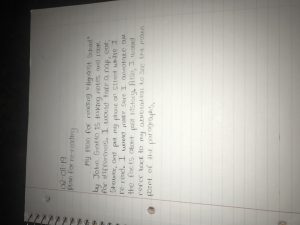In the article,”Against School” by John Taylor Gatto, he argues that the American public school system conditions children to be gullible, mindless consumers. After my experience with K-12 schooling, I agree with him. I especially noticed this during my four years of high school. Maybe it was the high school that I attended in particular, but it made me realize how flawed our educational system is.
One of the biggest problems with public schools today is that academic performance is declining, particularly in urban areas and among disadvantaged populations. My high school is an example of this. My school actually had three other schools in the same building and the one I was attending just so happened to be the worse one. Why? I believe there are so many factors that contributed to this school underachieving. One of those factors was actually mentioned in this article; boredom.
As Gatto himself put it,”boredom and childishness were the natural affairs in the classroom.”(1) Boredom comes as a lack of engagement and causes students to become inattentive. How can you learn something new if you aren’t engaged in the process? Then the problem is that many times teachers can’t see past the behaviors that indicate boredom. Instead of examining the environment and the activities, they begin to assign negatives to the students. This only causes more stress and doesn’t eliminate the problem at all. This leads to cheating and skipping class which were both very popular in my school. We are conditioned to believe that boredom in a classroom is normal. But is it really? Well, what can be done to change that? The answer is in this article. “We could encourage the best qualities of youthfulness – curiosity, adventure, resilience, the capacity for surprising insight – simply by being more flexible about time,texts, and tests, by introducing kids to truly competent adults, and by giving each student what autonomy he or she needs in order to take a risk every now and then.”(1)
Another factor has to be the teachers that we had in that school. We had teachers who simply didn’t care, lacked knowledge in what’s supposed to be their area of “expertise”, or just simply couldn’t conduct a class. This was one of the major problems in this school. Especially when you had teachers sleeping in class, playing inappropriate videos in class, using derogatory words towards students, etc. With this happening, why would students behave if the adults couldn’t either?
Gatto points out numerous times that there is a difference between “education” and “schooling.” “Schooling” is something that is mandatory and requires a deadly routine of six classes a day, five days a week, nine months a year, for twelve years. “Education” has more room for autonomy. Gatto raises the question of “Why, then, do Americans confuse education with just such a system?”(2) The American school system that in Gatto’s opinion, conditions kids to be mediocre intellects, to have no leadership skills, to obey reflexively. Where I don’t completely agree with Gatto is where he states, “We have been taught in this country to think of ‘success’ as synonymous with, or at least dependent upon ‘schooling’ but historically that isn’t true in either an intellectual or a financial sense.”(2) I do believe thought that our education system as boring and redundant as it may be, it is necessary to give our children an education that will hopefully improve their lives. That’s why it is important to provide some change. Gatto gives the examples of Carnegie, Twain and Farragut among others as successful people who did not finish high school. While similar examples could be pulled from today’s society such as Bill Gates and Steve jobs who did not complete college, these are rare cases that are not relevant to everyone. We live in a more complex world that requires greater and broader knowledge to succeed. It is no longer possible to be successful like Edison by just inviting a light bulb and not all who drops out of high school or doesn’t go to college will get lucky like Bill Gates and Steve Jobs. Nevertheless, I believe that the major concern here is why there hasn’t been anything done to reform the school system. There should be no reason for graduates to feel as if they have wasted the last fifteen years of their life with pointless busy work.
In conclusion, the point is that we have to recognize the flaws in our educational system so that our future children don’t fall victims to this problem. One thing that I know for sure is that I don’t want my kids to feel how I felt when I started college. I felt like I was cheated. We can say with certainty that parents, families, and communities are as much a part of the educational process as are children, teachers, and staff.




